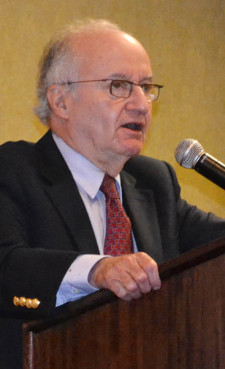(RNS) Here are my picks for the top 10 religion stories of 2012:
1. Islam dominated the year, with power struggles between Islamists and secularists in Egypt and Turkey and the brutal Syrian civil war with Bashar Assad killing thousands of his own people. An obscure anti-Muslim video produced in California triggered riots throughout the world. In November, Hamas, cited by the U.S. government as a terrorist organization, and Israel engaged in armed conflict until a cease-fire was declared. Christian minorities in Muslim societies suffered in 2012, especially the ancient Coptic Christian community in Egypt.
2. The “religious right” and Christian leaders Franklin Graham, Richard Land and Ralph Reed were losers when President Obama was re-elected, and three states legalized same-sex marriage and a fourth rejected a gay marriage ban. The U.S. Conference of Catholic Bishops publicly opposed the federal contraceptive mandate, but Obama narrowly won the Catholic vote. He lost the Protestants by 15 points, but his biggest supporters — by a 70-point margin — were the “nones” who profess no religion. For the first time in history, no white Protestant was on either party ticket.
3. Mainline Protestant churches continued to lose members, and the number of Americans identifying as Christians also declined. The big gainers were the “nones” — now about one in five Americans.
4. The Anglican Communion’s new leader, former oil executive Justin Welby, succeeds Rowan Williams as the archbishop of Canterbury. Both men favor women as bishops, but the Church of England’s General Synod rejected the idea. Interestingly, the presiding bishop of the U.S. branch of Anglicanism, the Episcopal Church’s Katharine Jefferts Schori, is a woman.
5. The Catholic Church’s continuing sex abuse scandal was highlighted by the criminal conviction of Bishop Robert W. Finn of Kansas City, Mo., who was found guilty of not reporting one of his priests who had taken hundreds of pornographic pictures of minors. Finn faced one year in jail and a $1,000 fine, but he was sentenced instead to two years of court-supervised probation, a first for an American bishop. A high church official in Philadelphia was also convicted for shuffling known abusive priests around his archdiocese.
6. For nearly a decade, the Presbyterian Church (USA) has debated whether to divest its investments from companies doing business in Israel. The proposal was defeated at the denomination’s General Assembly in Pittsburgh. Similar efforts by several other Protestant church bodies also failed.
Christian-Jewish relations suffered a setback in October when 15 church officials, mostly Protestants, issued a letter urging the U.S. to reconsider aid to Israel because of the Jewish state’s alleged “human rights violations” and “breaches of international law.” Jewish leaders criticized the letter, calling it one-sided and an example of a myopic “double standard” toward Israel, and withdrew from interfaith talks.
7. Anti-Semitism remains a pathological force in Europe and the Middle East. A recent soccer match in Rome turned ugly when fans began yelling anti-Jewish slogans at a visiting British team. Ten fans were injured by an Italian gang wielding baseball bats, knives and broken bottles. Officials were investigating whether anti-Semitism was behind what appeared to be an organized attack.
In Hungary, some right-wing politicians want to “screen” and register Jewish citizens in government because they are all considered “security risks.” More than 10,000 Hungarians in Budapest rallied against rising anti-Semitism. Many political, literary and academic European elites supported boycotts and sanctions directed against Israel.
8. Pope Benedict XVI, 85, was the subject of speculation about his increasing frailty and fatigue and whether he might be the first pontiff in 700 years to retire. There was also conjecture about his possible successor. However, during 2012 Benedict published a new book on Jesus and began to post messages on Twitter.
9. The year saw the proliferation of “couch churches” or “sofa synagogues,” decentralized gatherings of Jews and Christians who study, pray and share meals in a nonstructured form without benefit of clergy or the need to attend services in “big box” sanctuaries.
10. Notable deaths included the 26 innocent children and teachers at an elementary school in Newtown, Conn.; Unification Church founder Sun Myung Moon; former Israeli Prime Minister Yitzhak Shamir; and on a personal note, Lawrence Guyot, with whom I marched during a 1964 voting rights drive in Hattiesburg, Miss.

Rabbi Rudin, the American Jewish Committee’s senior interreligious adviser, is the author of the recently published “Cushing, Spellman, O’Connor: The Surprising Story of How Three American Cardinals Transformed Catholic-Jewish Relations.” RNS photo courtesy Rabbi Rudin
KRE/AMB END RUDIN




